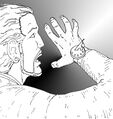Template:Selected anniversaries/August 31: Difference between revisions
No edit summary |
No edit summary |
||
| Line 64: | Line 64: | ||
||2000: John Alexander Simpson dies ... worked as an experimental nuclear, and cosmic ray physicist who was deeply committed to educating the public and political leaders about science and its implications. Pic. | ||2000: John Alexander Simpson dies ... worked as an experimental nuclear, and cosmic ray physicist who was deeply committed to educating the public and political leaders about science and its implications. Pic. | ||
||2002: George Porterdies ... chemist. He was awarded the Nobel Prize in Chemistry in 1967. Pic. | |||
||2005: Joseph Rotblat dies ... physicist and academic, Nobel Prize laureate (b. 1908) | ||2005: Joseph Rotblat dies ... physicist and academic, Nobel Prize laureate (b. 1908) | ||
Revision as of 10:15, 6 January 2019
1635: Mathematician, theologian, and crime-fighter Marin Mersenne uses new theory of acoustics to detect and prevent crimes against mathematical constants.
1649: Architect Inigo Jones uses Vitruvian rules of proportion and symmetry to design buildings which are resistant to crimes against mathematical constants.
1897: Thomas Edison patents the Kinetoscope, the first movie projector.
1899: Georg Cantor writes to Dedekind, remarking that his "diagonal process" could be used to show that the power set of a set has more elements than the set itself.
1945: Mathematician and academic Stefan Banach dies. He was one of the founders of modern functional analysis.
1950: Mathematician and philosopher Kurt Gödel addresses the International Congress of Mathematicians, in Cambridge, Massachusetts, on his work in relativity theory.
2017: Signed first edition of The Eel Discovers Time Travel sells for two and a half million dollars."






